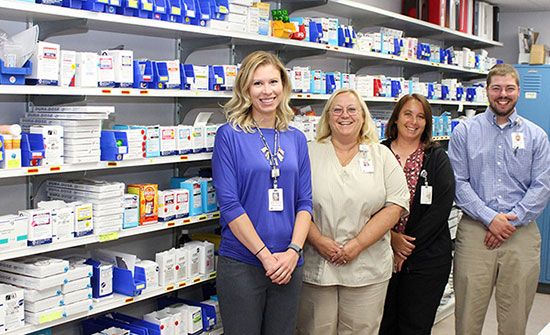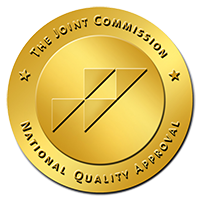Accuracy key to running hospital pharmacy

The BBGH Pharmacy Department team is shown here in front of just a few of the medications the department has on hand. They are, l-r: Pharmacy Manager Amy Borcher, PharmD; Pharmacy Technicians Mona Foster, CPhT and Kris Lehl; and Matt Pinneo, PharmD.
Operating a hospital pharmacy is a tad different than your usual neighborhood drug store. Accuracy when filling out ordered pharmaceuticals is of course paramount for both, but hospital pharmacies have to prepare a wider variety of prescriptions, ranging from pills and ointments to IV solutions and chemotherapy drugs. A hospital pharmacy is also an integral part of the medical team care for patients, conducting roundings each day to educate them on the medications prescribed for their treatment regime and suggesting prescription alternatives to physicians and other medical providers when appropriate, to name a few.
The Box Butte General Pharmacy Department team consists of Pharmacists Amy Borcher, PharmD and Matt Pinneo, PharmD, along with Pharmacy Technicians Mona Foster, CPhT and Kris Lehl. Pharmacy Manager Dr. Borcher has been with BBGH for three years; Dr. Pinneo one month (see sidebar introduction story); Ms. Foster six years and Ms. Lehl five years.
“Our pharmacy team provides medications to every department in the hospital, including the Emergency Department, our clinic, surgery, nuclear medicine, infusion, patient care unit, etc.,” Dr. Borcher said. “We also utilize the University of Nebraska remote pharmacy service, which helps verify medication orders. As pharmacists, they make sure that medication is appropriate for the patient, looking at other medications the patient is taking to check for interactions and make sure the dose is appropriate for that particular patient. That service is available to us 24/7.”
Dr. Pinneo is currently responsible for participating in rounds with patients at the hospital. “I look over all the patients’ profiles and make sure they are being treated appropriately. I’ll collaborate with nurses to clarify instructions for prescription dosage and delivery, etc. In the future we hope to implement bedside reports which will allow patients to more involved with the discussion about their care, with providers present during the report as well as other department representatives involved with the overall treatment regime for the patient.”

BBGH Pharmacist Matt Pinneo demonstrates the use of their department’s new Germfree isolator unit used to mix sterile compounds for IVs. “The unit uses positive air pressure to keep the air sterile, with a filter on top that filters out microbes down to two microns in size,” he said.
Another best practice the Pharmacy staff has been involved with is a nationwide effort to promote Antimicrobial stewardship. “Most people probably know that we have a problem with infectious diseases developing resistance to many of the more common antibiotics. What the stewardship program does is to make sure that infectious diseases are treated with the most appropriate antibiotic. So instead of using a wide spectrum antibiotic, the program promotes the selection of the optimal antimicrobial drug regimen, dose, duration of therapy, and route of administration.” Dr. Pinneo said the pharmacy is developing a formal program. “Right now we’re going case by case, researching and then providing our evidence to our providers on what antibiotic is optimal for that particular infectious disease and patient. They have been very receptive to our recommendations, since we all know we have a big problem with antibiotic resistance.” Dr. Borcher added “While the patient is in the hospital, we make sure the prescribed antibiotic is taken by the patient. Once the patient leaves, we stress that they continue to take the medication until it’s all used, since another problem with bacteria becoming drug resistant is the fact that people tend to stop taking their medication once they start to feel better. They need to keep taking their medication until it’s gone. If they don’t, they’re just making the bacteria still in their system more resistant to treatment.”
Pharmacists and certified technicians at the hospital have extensive sterile compounding duties they have to do each day, which involves mixing IV solutions for a variety of medical needs, from fluids to antibiotics and chemotherapy (see accompany photo). “We just replaced our old sterile unit with a new “Germfree” isolator that filters out all airborne microbes using a filter system that filters the air down to two microns,” Dr. Pinneo said. “Compounding a sterile product can take anywhere from 10 to 30 minutes, depending on what formula the provider has ordered.”
One struggle pharmacies across the nation have every day is dealing with chronic drug shortages. “Drug shortages are ongoing,” Dr. Borcher said. “All four of us work every day on the problem. Chemotherapy drugs are always in short supply. Antibiotics are another drug class on shortage right now. There can be several reasons. Maybe a manufacturer has shut down production for a while, or they’ve stopped making it because it’s not profitable anymore. Or maybe the order amount has exceeded what was expected and they didn’t produce enough. We always check the American Society of Health Systems Pharmacists web site which publishes information on shortages as they occur. That way we can see what drugs will soon be in short supply, and order what we feel we’ll need to get us through the shortage. We’ll also work to identify alternative drugs we can use to alleviate the shortage problem on a particular drug.”
Working in a hospital setting is satisfying for the pharmacy team. “Our days always have new challenges with a wide variety of duties needing to be performed,” Dr. Borcher concluded. “We have a great team to meet those challenges and duties with accuracy and safety paramount. I’m very proud of our team.”
Box Butte General Hospital is an equal opportunity provider and employer.


